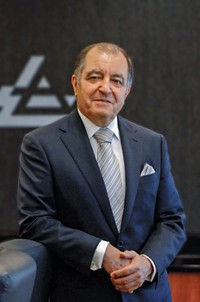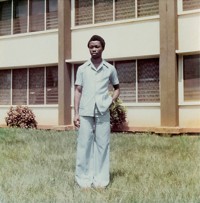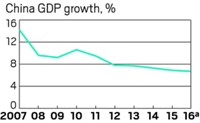Advertisement
Grab your lab coat. Let's get started
Welcome!
Welcome!
Create an account below to get 6 C&EN articles per month, receive newsletters and more - all free.
It seems this is your first time logging in online. Please enter the following information to continue.
As an ACS member you automatically get access to this site. All we need is few more details to create your reading experience.
Not you? Sign in with a different account.
Not you? Sign in with a different account.
ERROR 1
ERROR 1
ERROR 2
ERROR 2
ERROR 2
ERROR 2
ERROR 2
Password and Confirm password must match.
If you have an ACS member number, please enter it here so we can link this account to your membership. (optional)
ERROR 2
ACS values your privacy. By submitting your information, you are gaining access to C&EN and subscribing to our weekly newsletter. We use the information you provide to make your reading experience better, and we will never sell your data to third party members.
Business
Movers And Shakers
Sunil Kumar, Chemical Industry Medalist
Chemistry and opportunity in the U.S. aided his climb from poverty to executive suite
by Marc S. Reisch
March 10, 2014
| A version of this story appeared in
Volume 92, Issue 10

“I love chemistry,” says Sunil Kumar, retired president and chief executive officer of specialty chemical maker International Specialty Products (ISP) and this year’s winner of the Chemical Industry Medal. “The most fun part of the jobs I’ve had was the chemistry.”
Although trained as a mechanical engineer, Kumar found that he liked the products of chemistry and had a knack for translating them into marketing successes. That talent, over the course of a 41-year career, helped India-born Kumar rise from near penniless immigrant to the U.S. to high-level executive at the tire maker Firestone (and later Bridgestone), the roofing supplier GAF, and ISP.
Kumar, 64, continues his love affair with chemistry today through Wembly Enterprises, a family investment vehicle that acquires chemistry-based businesses. His is a rags-to-riches story that could only have happened in America.
When Kumar receives the Society of Chemical Industry medal on Tuesday, March 11, at the Waldorf Astoria Hotel in New York City, it will be in part for building ISP into a leading specialty chemical firm. The award also recognizes Kumar’s role in establishing the SCI America Scholars Program, which provides internships for chemistry and chemical engineering students at major chemical firms.
SCI America, an organization of U.S. chemical industry chief executive officers, has awarded the Chemical Industry Medal for more than 85 years. It recognizes those whose leadership, commitment, and contributions have aided the chemical industry. Recent recipients include Andrew N. Liveris of Dow Chemical, David N. Weidman of Celanese, and J. Brian Ferguson formerly of Eastman Chemical.
COMPANY MAN
Milestones in Sunil Kumar’s career
1971 Earns mechanical engineering degree from Indian Institute of Technology
1973 Receives M.B.A. from the University of Louisiana
1973 Joins Firestone as an engineer
1984 Named president of Firestone Building Products
1990 Serves as executive vice president of Bridgestone/Firestone
1995 Becomes president and CEO of GAF Materials
1999 Begins tenure as president and CEO of International Specialty Products
2011 Retires from ISP after its sale to Ashland
Kumar came to the U.S. in 1971 with great expectations but few resources. “My father had to borrow the $700 for my airline ticket,” he says.
Kumar was then and still is a passionate admirer of what he calls “the American civilization.” He defines that civilization as a place where government mostly works and people who work hard can do well.
He headed for the U.S. right after graduating from the prestigious Indian Institute of Technology (IIT), in Madras, with a degree in mechanical engineering. “In the early 1970s, India was a bad place to be,” Kumar recalls. “There was not much encouragement for private enterprise, and most people got jobs with government entities. That was not my cup of tea at all.”
At the time, Kumar says, about two-thirds of IIT graduates headed to the U.S. almost as soon as they left school. Of the one-third who remained in India, more than half would go to the U.S. a year or two later. Another IIT graduate who came to the U.S. at about the same time was Raj L. Gupta, former CEO of Rohm and Haas and the 2007 winner of the Chemical Industry Medal.
Unlike Gupta, who went to Cornell University to earn a master’s degree in pursuit of an academic career, Kumar wanted to enter the business world right away. He secured a spot in the M.B.A. program at the University of Louisiana, Monroe. Key to his decision to go there was the financial support he got from the university.
“Graduate assistantships are typical in science but rare in business school. They made an exception for me; it was the break I needed,” Kumar says. Separately, he snagged a job at the 7-Eleven near the campus to earn the money he needed to repay his father for the plane ticket.
Working at 7-Eleven taught him how to relate to people. The blue-collar workers who came into the store “were fabulous, down-to-earth people with no pretensions,” Kumar recalls. Working at the store also taught him that management systems often function better in the U.S. than in India. “At the store, there was a system for inventory, pricing, and handling customers. The reason 7-Eleven worked well is that it had a way to get products and customers in and out.”
After earning his M.B.A., he got a job as an engineer at Firestone’s building products business. Two years later, he entered a management program that took him out of the plant and into an office job in Akron, Ohio, with the firm’s senior managers.
It was there he met the man who gave him his big opportunity: Leon R. Brodeur, then head of Firestone’s nontire operations and later president of the entire company. Brodeur put Kumar in a sales position in the firm’s coated-fabrics business, where he found a rubber roofing line that was just limping along.
No one had quite figured out how to make the roofing system work, and that’s where Kumar first turned to chemistry. “The right adhesives made all the difference in sealing the seams,” he says. Firestone developed the adhesives with the help of Uniroyal. Kumar and his team also came up with a contractor certification and roofing guarantee system to help sell the roofing to commercial customers.
“Well, it just took off. We couldn’t keep the product on the shelf,” Kumar says. “The company was delighted and featured me in their annual report, and I was invited to meet the board.” By 1984, he was president of the building products business.
After Bridgestone bought Firestone in 1988, Kumar was tapped to head the firm’s retail tire operations, which were hemorrhaging cash. Applying some of the lessons he learned from his 7-Eleven days, Kumar took the business from losing $500 million a year to earning that much.
Kumar’s marketing and sales successes brought him to the attention of Samuel J. Heyman, a legendary investor known for his attempted takeovers of petrochemical giant Union Carbide and other chemical companies. One firm Heyman succeeded in buying was the roofing products maker GAF, and in 1995 he recruited Kumar to head it.
At GAF, Kumar followed the playbook that worked at Firestone by implementing a contractor certification and roofing guarantee system for GAF’s shingles. Four years later, Heyman asked Kumar to head the former GAF chemical operation, which by then was called ISP.
What made working at ISP fun was the chemistry. Kumar says he loved that polyvinylpolypyrrolidone could clarify beer or that butanediol-based adhesives could be added to toothpaste to bond gingivitis-fighting active ingredients to teeth. “To see it work was absolutely fascinating. I loved going to customers and meeting with R&D people.”
He also worked for a tough, outspoken boss. “Sam Heyman was a guy who had strong opinions when he was in front of a group. But when you met him one-on-one, he was very open-minded,” Kumar recalls. Rather than confront him in public, Kumar would call Heyman at home to discuss disagreements, “and more than half the time, he would change his mind,” he says.
“Sam was bright and hardworking and intellectually honest,” Kumar says. “It was easy to live with his difficult nature when you knew the other side.”
In 2003, Heyman tried but failed to buy the chemical maker Hercules and merge it with ISP. Ironically, the two firms eventually did come together: Ashland bought Hercules in 2008 and then ISP in 2011. Kumar’s last job at ISP was to engineer the sale.
Kumar stepped down at the start of a period of improvement for the U.S. chemical industry. Low-cost, domestically produced oil and gas from shale began providing companies with energy and feedstock advantages over European and Asian competitors. Combine that with high productivity and a low cost of capital, and the U.S. will become a huge exporter in the years to come, Kumar predicts.
Although India also offers better business opportunities than when he left it, they still can’t compare with the opportunities available in the U.S., Kumar maintains. He spends part of his time as an adviser to the Indian energy and chemical giant Reliance Industries, providing advice on elastomers plants now under construction in India.
India’s economy grows at 6% a year, but its per capita output is stagnant because of population growth. In the U.S., lower population growth and 3% economic growth mean real per capita growth. And although India graduates large numbers of engineers, most, Kumar contends, aren’t well trained.
“There must be something wrong when a country that graduates 300,000 engineers per year gets no Nobel Prizes, gets few patents, and has only a $1.8 trillion economy,” Kumar says.
He sees no need for the U.S. to churn out engineers to better compete with India. Although the U.S. can always stand to improve its educational system, Kumar says, the country already “has more than enough brilliant scientists, inventors, and chemists.”
What the U.S. shouldn’t do, Kumar says, is send talented foreigners trained in U.S. schools back to their home countries because of visa restrictions. “That is like gold slipping through your fingers,” he says.
In addition to consulting for Reliance, Kumar has occupied himself since retiring from ISP by buying two companies through Wembly Enterprises. Nylon Corp. of America, a maker of specialty nylon for wire and cable coatings, is now overseen by his daughter Monica. Universal Plastics, a maker of thermoformed seating components and medical device housings, is run by his son Jay. “I’m a huge believer in the resurgence of American manufacturing,” Kumar says.
He also continues to be a huge believer in America. “I wouldn’t say that a person born in America is superior to a person not born in America. God creates everyone equal,” Kumar says. But a person who is born in the U.S., or grows up, lives, and works in the country, “becomes superior after a number of years because America’s system is exceptional.”
As Kumar sees it, America “is a new civilization, and it is more than just immigrants coming here and finding jobs.” The country, he declares, “creates spectacular successes.”





Join the conversation
Contact the reporter
Submit a Letter to the Editor for publication
Engage with us on Twitter